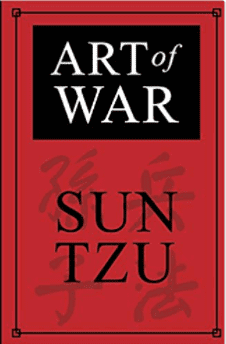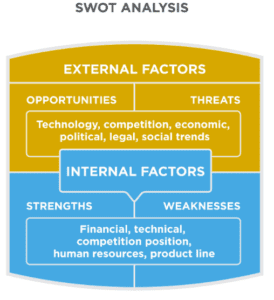In order to be successful in business, it is important to learn as much as you can about the strategies and tactics that can give you an edge over your competitors.
One of the best books ever written on this topic is The Art of War by Sun Tzu.
Military strategists have used this ancient Chinese text for centuries, but it can also apply to a business environment. In this article, we will discuss some of the key principles from The Art of War that can help you succeed in business competition.
Who was Sun Tzu?
Sun Tzu is a Chinese general, military strategist, and writer who lived during the Eastern Zhou period of ancient China. Sun Tzu is the author of The Art of War. This influential work of military strategy has influenced both Western and East Asian philosophy.

His works are more focused on alternative strategies to war, such as strategy, delay, the use of spying and alternatives to warfare, making and keeping alliances, deceit, and submission to stronger foes.
Sun Tzu is revered as a historical and military legend. In Chinese, Sun Tzu, which is an honorific, means “Master Sun”.
Sun Tzu’s historicity is unclear. His life was dated to 544-496 BC by Sima Qian, a Han dynasty historian, and other Chinese historians. Based on the style of its composition and the descriptions of war, modern scholars accept his historicity.
Since its creation, Sun Tzu’s work is praised and used in East Asian warfare. The Art of War gained popularity in the 20th century and was also used in Western society.
It has a significant influence on many competitive endeavors around the globe, including politics, culture, and business, as well as modern warfare. Sun Tzu's strategy for winning the conflicts of the time have proven to be timeless.
The Art of War
The Art of War is a Chinese military treatise written by Sun Tzu in the sixth century BC. The Art of War is one of the oldest and most successful books on military strategy in history.

It has been applied to business and managerial strategies for centuries.
Sun Tzu's the Art of War is a timeless text that can be applied to many different areas in life, including business strategy. One of the most important lessons from Sun Tzu's text is to be proactive, not reactive.
In order to be successful in business, it is crucial to take the initiative and act proactively instead of waiting for opportunities or problems to arise. Creating a business model that adequately considers competitive challenges is crucial to your success.
Reacting to situations will usually result in making poor decisions or being too late to take advantage of opportunities. Being proactive allows you to seize control of the situation and create your own opportunities.
By following the principles from the Art of War, you can improve your chances for success in business and achieve greater levels of success. Whether you are working to gain market share, improve your market penetration, or grow your profits, these timeless principles will help you achieve your goals.
Another important lesson from Art of War is the importance of business strategy. In order to be successful, you need to have a plan and be willing to make adjustments as needed.
There is no one-size-fits-all solution in business strategy, so as a business owner, it is important to be flexible and adapt your strategy as needed.
Business competition can be a significant obstacle to your success, so using the principles in the Art of War is important to winning in direct conflict.
Sun Tzu’s text can help you develop a strategic mindset and give you the tools you need to succeed. Like any military operation, your business strategy needs to be well planned and well-executed.
If you are looking for ways to improve your business skills, The Art of War is a great place to start. By learning the principles of military strategy from this ancient text, you can gain an edge over your competition and achieve greater success in business.
The Art of War remains a classic. It’s not just a military strategy masterpiece in the same way that Thucydides' Peloponnesian War is a classic.

The Art of War might as well be called The Art of Life since it advises readers to avoid war because it is too expensive and cannot be substituted for diplomacy and long-term strategies and that the outcome of the war is uncertain due to all the inherent variables.
Key Principles of The Art of War in Your Business
Here are some key business strategy principles from The Art of War that can help you as a business owner to achieve great success in business. There are numerous examples of small businesses gaining a significant competitive advantage using these strategies.
A common question regarding the Art of War and competitive strategy is "How did you apply the art of war in your business?" We will discuss numerous ideas that will serve to answer this question.
-
Be proactive, not reactive
In order to succeed, you need to be proactive, not reactive. Plan and take action rather than waiting for things to happen. As Sun Tzu says, “He will win who knows when to fight and when not to fight.”
-
Know your enemy and know yourself
In order to gain victory, you need to understand them as well as you understand yourself. Sun Tzu says, “If you know the enemy and know yourself, you need not fear the result of a hundred battles.”

- Use deception
Deception can be a powerful tool in battle. You can use it to mislead your opponents or make them overconfident. Sun Tzu says, “All warfare is based on deception.”
- Stay focused on your goal
As a business owner, you need to keep your eyes on the prize and don’t get distracted by side issues. Stay focused on what is important and don’t get bogged down in details.Sun Tzu says, “The general who wins a battle makes many calculations in his temple before the battle is fought. The general who loses a battle makes but few calculations beforehand.”
- Be prepared for anything
As a business leader, you need to be prepared for any situation that might arise. Sun Tzu says, “If you know the enemy and know yourself, you need not fear the result of a hundred battles.
If you know yourself but not the enemy, for every victory gained, you will also suffer a defeat. If you know neither the enemy nor yourself, you will succumb in every battle.”
Business intelligence systems can help you prepare for a variety of contingencies and unexpected circumstances.
Contemporary Principles of Military Strategy
Sun Tzu talks about many principles in the Art of War. These principles have been adopted and subsequently adapted by modern-day generals and other military leaders.

- The first principle is to know your enemy. In business, this means understanding your competitors and what strategies they are using to compete against you. You need to be aware of their strengths and weaknesses, and develop strategies that will exploit their weaknesses while protecting your own strengths.
- Another key principle is to keep your options open. In business, this means being flexible and willing to adapt to changing circumstances. You need to seize opportunities when they arise and be prepared to take quick action in order to capitalize on them.
- The third principle is deception. In business, this means being able to mislead your competitors about your true intentions or plans. You can do this by making false statements or by hiding information from them. By keeping your competitors in the dark, you can gain a strategic advantage over them.
- The fourth principle is to make use of timing. In business, this means knowing when to take action and when to hold back. You need to be aware of the current market conditions and what trends are happening in your industry. You also need to time your moves carefully so that you don’t miss out on any opportunities. The timing makes all the difference.
- The fifth principle is the concentration of force. In business, this means using all of your resources to achieve a common goal. You need to focus your efforts on what is most important, and avoid spreading yourself too thin. By concentrating your resources, you can achieve greater results than if you were to do everything yourself.
- The sixth principle is the economy of force. In business, this means using the least amount of resources possible to achieve your goals. You need to be efficient with your time and money, and make sure that every action you take contributes to your overall goal.
- The seventh principle is surprise. In business, this means attacking your opponents when they are not expecting it. You can do this by launching a sneak attack or by making an unexpected move. By surprising your opponents, you can catch them off guard and gain an advantage over them.
- The eighth principle is the unity of command. In business, this means having one person in charge of all aspects of the operation. This ensures that there is a clear chain of command and that everyone is working towards the same goal.
- The ninth principle is simplicity. In business, this means keeping your plans and strategies as simple as possible. You don’t want to overload your employees with too much information or make it difficult for them to understand what you are trying to do. By keeping things simple, you can ensure that everyone agrees and that they know what their role is in achieving your goals.
- The tenth principle is security. In business, this means protecting your assets and preventing your opponents from gaining an advantage over you. You need to have a good security system in place to keep your data safe, and you need to be prepared for any attacks that may come your way. By securing your position, you can minimize your risk of losing out on opportunities or profits.
Luck Favors the Prepared Mind
Sun Tzu's Art of War states that victory in battle could be achieved through careful planning and preparation.
In order to be successful in business, you must also be prepared for direct conflict with your competition. Small businesses are often reluctant to "poke the bear" with their larger competitors, but having a strong competitive strategy will help alleviate these fears.
This means doing your research, understanding your opponents, and planning a strategy that will give you an advantage.
Small businesses can’t afford to wait until the last minute to figure out what you’re going to do - by then it may already be too late.

Preparation is key to success in any field. As Sun Tzu said: “If you know the enemy and know yourself, you need not fear the result of a hundred battles.”
In order to apply Sun Tzu’s military strategy teachings to business and to gain a competitive advantage, it’s important to understand the different aspects of competition. Here are a few key points to keep in mind:
- The Art of War is not about brute force or overwhelming your opponent. It’s about using your resources wisely and exploiting your opponent’s weaknesses.
- Knowledge is power - the more you know about your competitors, the better equipped you’ll be to defeat them.
- Timing is essential - make sure you strike when the time is right, and take advantage of opportunities as they arise.
- Be prepared for setbacks and don’t give up easily. Victory may not always be achievable, but that doesn’t mean you should give up without a fight.
By understanding these concepts and applying them to your business strategy, you can give yourself a competitive edge and succeed in the marketplace.
Competitive Intelligence
One of the key tenants of The Art of War is to know your enemy. This means gathering competitive intelligence so that you can understand your adversary’s strengths and weaknesses. By doing so, you can develop strategies that will help you be more successful in business.
There are several ways to gather competitive intelligence. One approach is to conduct a SWOT analysis of your competitor. This will help you identify their strengths, weaknesses, opportunities, and threats.

Another approach is to track their website traffic and see which pages are most popular. You can also look at their social media profiles to see what kind of content they’re sharing and how it’s resonating with their audience.
Whatever approach you take, it’s important to be as thorough as possible. The more information you have, the better equipped you’ll be to outmaneuver your competition.
Sun Tzu said, “if you know the enemy and know yourself, you need not fear the result of a hundred battles.” By using competitive intelligence, you can learn everything there is to know about your adversary and use that knowledge to your advantage.
So don’t be afraid to get creative to come up with a business strategy that will help you grow your market share and win the battle against your competition.
Your very survival may depend on it. Small business leaders must ensure that they have a competitive advantage in order to win battles that are inherently uneven.
Sun Tzu also said, “The highest form of generalship is to win without fighting.” It’s important to remember this as you gather competitive intelligence—your goal is not to defeat your competition, but to win with no actual combat.

This may require some creativity and innovation, but you can do it if you approach it in the right way. Business leaders can succeed in their competitive endeavors through the proper application of competitive strategy development and execution.
So use competitive intelligence wisely and always keep your eye on the prize — success in business!
Win Without Fighting
Sun Tzu said that the acme of military strategy is to win without fighting. The blue ocean business strategy is a business approach that seeks to create uncontested market space and make the competition irrelevant.
It can be used in any industry, and it asserts that there are opportunities for innovation and growth that can be pursued without resorting to head-to-head competition.
When done correctly, the blue ocean strategy can cause dramatic increases in market share and profitability. No business has too many resources.
You must conserve your power and resources to use them in a focused way to win important battles.

There are three keys to success with this approach: identify untapped markets, focus on value creation, and break the mold of traditional thinking.
Sun Tzu is considered the father of the blue ocean business strategy. He believed that war should be avoided and that victory could be achieved without lengthy campaigns through cunning and diplomacy.
In his book, The Art of War, he outlined a strategic approach to winning without conflict.
The blue ocean strategy is based on the same principles as Sun Tzu’s approach to warfare. It is a way to achieve success by creating uncontested market space and making the competition irrelevant.
By applying the blue ocean strategy, business leaders can break away from the traditional competitive mindset and find new ways to win.
There are several steps involved in creating a blue ocean strategy:
- Define your target market: Who are you trying to reach?
- Identify your unique offering: What do you offer that is different from everyone else?
- Create a compelling value proposition: Why should people buy from you instead of your competitors?
- Develop a strategic plan: How will you execute your strategy and achieve success?
The Blue ocean strategy can be used in any industry or market. It is a powerful way to stand out from the competition and win without fighting. If you are looking for a new way to succeed, the blue ocean strategy may be the answer.
Deception
Deception is often an important part of a business strategy, as it can surprise the competition and gain an advantage. For example, a company might conceal its intentions or plans from its competitors in order to get them to make mistakes.

Alternatively, a company might release false information about its products or services in order to mislead the competition into thinking that it is not a threat. Deception can be a powerful tool, but it must be used carefully, as it can also backfire if the deception is discovered.
There are many types of deception that can be used in business, and each has its own advantages and disadvantages. Some of the most common types of deception include:
-
Concealing information
This is probably the most common type of deception, and it involves hiding information from the competition. For example, a company might not reveal its plans or intentions to its competitors, or it might hide details about its products or services.
-
Disinformation
This is simply lying to the competition in order to mislead them. For example, a company might make false claims about its products or services in order to make the competition think that it is not a threat.
-
Distorting information
This involves presenting information in a way that is misleading. For example, a company might release misleading statistics about its products or services, or it might disguise its true intentions.
-
Feigning weakness
This is when a company pretends to be weaker than it really is in order to lure the competition into a false sense of security. For example, a company might make exaggerated claims about its lack of resources or capabilities in order to get the competition to relax its guard.
-
Creating diversions
This involves drawing the competition’s attention away from key areas or activities by creating distractions. For example, a company might launch a publicity campaign for a new product in order to distract the competition from its real plans.
Each of these types of deception can be effective in achieving different goals. Concealing information can gain an advantage by keeping the competition in the dark, while lying can be used to deliberately mislead them and distort their understanding of your business.
Feigning weakness can make the competition overconfident and create openings for an attack while creating diversions can draw their attention away from important areas.

Ultimately, the type of deception that is most effective will depend on the specific situation and the goals of the business. However, it is important to remember that deception should be used sparingly, as it can easily backfire if it is discovered.
So, before implementing a deception strategy, make sure that you have considered all the potential risks and consequences.
Next Steps
If you want to use The Art of War in your business as a tool to develop a winning strategy, here are some ideas for the next steps:
- Make a list of the principles in this article. Line up elements of your existing plan as well as ideas you have that can be added to your plan to ensure that you are employing strategies that are aligned with The Art of War.
- Run a strategy development conference. Use ideation sessions, breakout groups, creativity sprints, design thinking sessions, and other tools that will help you come up with interesting and effective strategy concepts that exploit your strengths while targeting the weaknesses of your competition.
- Conduct a wargame session. Wargames can help you anticipate the likely actions and reactions of your adversaries as you operate and execute your plans. Often business plans are very inwardly focused and fail to fully anticipate the actions of other participants in your market.
- Engage a strategy consultant to help you identify the strengths and weaknesses of your business and those of your competition, ideate strategy concepts to exploit those insights, and help you implement deception, surprise, and a plan of attack that will help you win.
- Continue to read and study The Art of War and other materials that explain the principles of conflict, competition, strategy, and execution.
Use The Art of War in Your Business
Asymmetric, led by former Army Delta Force operator and corporate executive, Mark Hope, can help you implement these ideas in your business. You can contact Mark by email at mark.hope@asymmetric.pro, or by telephone at +1 866-389-4746, or you can schedule a complimentary strategy discussion by clicking here. You can read all of his articles on Medium.

Mark Hope
Mark A. Hope is a co-founder and Partner of Asymmetric Marketing – a unique agency specializing in building high-performing sales and marketing systems, campaigns, processes, and strategies for small businesses. Asymmetric has extensive experience with organizations across many industry segments. If you would like some help in implementing ideas like these in this article, feel free to give Mark a call at 844-494-6903 or by email at mark.hope@asymmetric.pro. Read Mark's other work on Medium.


